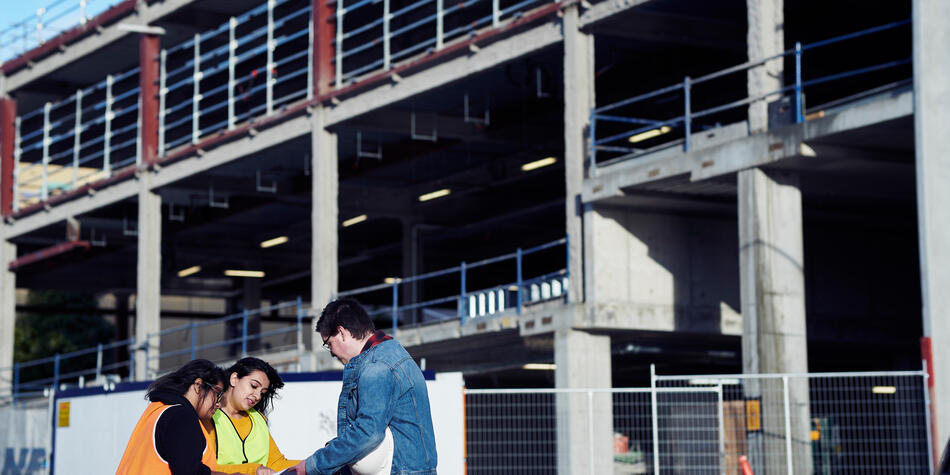We've all watched a huge construction project take shape. From afar it can seem like everything comes together seamlessly. Behind the scenes, the coordination of budgets, contractors, clients and stakeholders to deliver the construction of a building on time and on budget is no easy feat.
If you're not afraid of high stakes, a career in construction project management provides both challenges and rewards in equal measure.
For Kirsty Edwards, a project manager with ProBuild, studying the Bachelor of Design (Architecture)/Bachelor of Construction Management (Honours), followed by a Master of Architecture, provided the pathway to a highly successful career.
Building a career in project management
Just over a decade after graduation, Kirsty now leads the delivery of large construction projects. 'My last project was the towers in Ritz Carlton at Elizabeth Quay in Perth and that was a $450 million job,' she says.
Along with a team of 25 reporting to her, Kirsty delivered one of the two towers. 'Over the lifecycle of the project we inducted over 4500 subcontractors onto that job,' she says. 'My day-to-day involves looking after all aspects of the project safety, commercial, client, key stakeholders, subcontractors.'
Kirsty had wanted to be an architect from the age of ten but after working for some architecture practices while studying, she soon realised the construction industry was where she wanted to be.
By studying both construction and architecture, Kirsty developed a combination of skills sought after by Tier 1 builders. 'You have the construction knowledge and a strong technical skillset from construction methodology,' she explains. 'Also, the architecture side means that your design management skills are a bit stronger than other universities graduates and you have a solid project management knowledge base.'
The traits needed for working in construction management jobs
So what type of personal traits are required for a career in construction? 'You have to have pretty thick skin and a decent backbone,' Kirsty says. 'And decision-making ability is a key attribute, especially in my current role. You have to be able to make an informed decision.' Kirsty adds her studies equipped her to be able to develop decision-making processes, despite not being directly covered in the course material.
It's also essential you know how to build and work with teams. 'I work with a team in every aspect of what I do,' Kirsty says. 'You don’t have a solo role in the industry – you’ve got to be able to work with people.'
If you're keen to gain an edge, gaining some industry experience is important. 'I always made sure that I had employment within the industry whether it was in architecture or construction,' Kirsty says, who maintained a part-time job in the industry during her studies. She also tutored and lectured at Deakin, which increased her exposure within the University and the industry. On top of this, Kirsty also worked outside of the industry while studying to help manage her bills.
Towards gender diversity in construction
It's no secret construction is still a very male dominated industry. 'Having females in leadership roles and onsite management roles and apprentices through trades is so important to create a really good working dynamic.'
Kirsty believes the construction industry can provide very rewarding careers for everyone. 'Growing and maintaining females in the industry is something that I feel very passionate about,' she says. 'I think maintaining females in the industry is probably harder than attracting females to the industry because it's very demanding from a time perspective.' Kirsty says all businesses in the construction industry have to work through this challenge.
'As a female in the industry you need to build up a resilience and a confidence in yourself,' Kirsty says. 'I think the Deakin course gave me a good confidence in my capabilities. I think that's really important for both male and females but for females it's really something that needs to be emphasised.'
Kirsty's advice for those interested in working in the construction industry? 'Get in there, roll your sleeves up and have a go because what have you got to lose?' She says her studies were good preparation for her career. 'There were always new things to be learning and that doesn't change once you get out into the industry – there is always something new to learn and there's always a new challenge.'
Learn more about how to get into the construction industry through construction and property.

